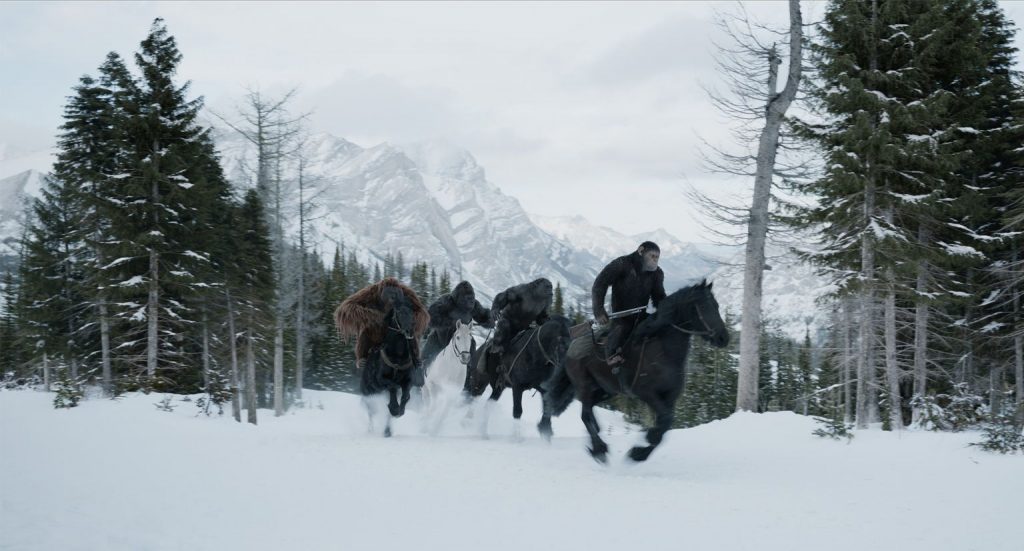Directed by Matt Reeves | Written by Reeves and Mark Bomback | 140 min
A prequel to the classic, The Planet of the Apes, from 1968, seemed like a weird idea, but when has that ever stopped anyone in Hollywood. No, that’s not even a question.
Rupert Wyatt’s Rise of the Planet of the Apes, from 2011, is an entertaining b-movie. My biggest gripe is the substandard CGI. It crystalized my dislike for the technology in this kind of a story, as a fantasy element in an otherwise realistic, contemporary setting. The CGI is much improved in Reeves’ Dawn of the Planet of the Apes, but the script aimed at bringing some ape vs ape duality to the story was weak and the drama forgettable.
So I walked into the third movie—purporting to bring an end to the franchise at a trilogy—with easily managed expectations. What a wonderful surprise to find it’s far and away the best of the three, a new level in both the storytelling and the special effects. It’s as different in tone and scale from the previous films as Logan was to the first two Wolverine films. Like them, it takes what was fairly mediocre dystopic fantasy and delivers a wallop with distinct characters and real emotion.
Caesar (Andy Serkis in performance capture) is hiding out in the forested, rainy mountains with his simian family and friends while the war, started in the last film with the remaining, highly weaponized humans, continues. When Caesar pays a very personal price in said conflict, he directs his people to escape to safety in the desert, while he and a small group of comrades—Maurice (Karin Konoval), Rocket (Terry Notary), and Luca (Michael Adamthwaite)—join him, along with another talking chimp named Bad Ape (Steve Zahn), and young human girl they pick up along the way, Nova (Amiah Miller), whose name (and silence) will have some significance for anyone who remembers the ’68 Planet of the Apes.
This third film of the franchise distinguishes itself right away in its pacing and editing. While its scenes of action are impactful, it takes time lingering in more intimate moments and allows the characters to manifest. This story is in no hurry, and that’s to its credit. Reeves must realize that the special effects visualizing the apes has gotten so good he doesn’t have to rush.
The close-ups, a big problem with Rise, have been completely solved here. It’s astonishing—the tech has gone from unbelievable through the uncanny valley to what lies on the other side: total plausibility. The actors behind the apes are able to give fully fledged performances through their CGI masks, and Serkis has never been better. Oh, and big shout out to Michael Giacchino who delivers a moody and suitably epic score.
The film is a journey to salvation, a revenge drama, a western, and a war picture with more than a little debt to Apocalypse Now, any number of prison escape movies, and even, and I shit you not, The Ten Commandments. There’s a lot of genuine feeling here, and even a few laugh-out-loud moments.
But I wasn’t so bowled over by the things I liked in the film to not be perturbed by a bum note or two: Woody Harrelson is far too warm and charming to play a character as terminally embittered as The Colonel, the leader of the human faction. It’s not that he’s bad in the part, he’s just entirely miscast—he’ll never be a sinister dude. But this small misstep barely shakes what is otherwise the summer’s biggest and best surprise so far.










